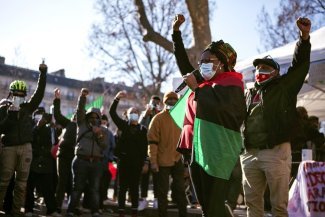On Sunday, 18 May 2014, the 3rd ITUC World Congress will open in Berlin. The International Trade Union Confederation (ITUC) represents the largest democratic movement in the world. An estimated 1500 people from 161 countries and 365 national union centres will come together as one union movement and to represent the world’s working people.
Tragically for working people, the world’s leaders have not defended the policies necessary to ensure secure and inclusive democracies and a sustainable planet for the 21st century.
World leaders and international institutions are pursuing an economic agenda that has created greater inequality and devastating unemployment, undermining democracies everywhere.
Even “Social Europe”, where rights and protections have traditionally been strong, is under attack. The ‘structural adjustment’ policies of the 1980s and 90s crippled development in poorer countries, just as today ‘austerity’ has damaged employment, growth and inclusion in many developed nations.
But the global economy is no more secure in 2014 than it was seven years ago.
Business and its political supporters have used the ‘Great Recession’ to tip the balance of power firmly towards large corporations at the expense of ordinary people. They have reversed decades of progress made by trade unions and other progressive forces.
Economic decisions, such as curtailing collective bargaining, restrict people’s rights and have undermined confidence in governments, the ITUC Frontline reports show.
There is a profound mistrust of institutions as people increasingly lose trust in governments that prioritise business interests over the wellbeing of working people.
Just 13 per cent of people surveyed in the ITUC Global Poll 2013 believe their government is focused on the interests of working families. The vast majority of people believe corporate power must be tamed.
Half the world’s population has direct or family experience with unemployment or reduced working hours. More than half are in vulnerable or irregular work, and 40 per cent struggle to survive in the desperation of the informal sector.
This is neither acceptable nor sustainable.
The central roles of collective bargaining, a living wage and social protection are at the heart of reducing inequality and ensuring decent work.
This means that social dialogue is fundamental to democracy, economic development and social cohesion. Collective bargaining at national and sectorial levels ensures workers’ rights are protected. The capacity of national unions to bargain with employers and influence government policies is central to ensure workers’ power.
Leading the fight
Trade unions across the world are leading the fight for economic and social change. Unions are fighting for economic and social justice with policies based on fair distribution of income rather than the empty promise of neoliberal austerity.
We know that working people need quality jobs, a social protection floor and a minimum living wage. Sadly, hundreds of millions of workers are currently denied the right to a minimum wage on which they can live with dignity, while 75 per cent of people have no or inadequate social protection.
Despite overwhelming evidence that neoliberal policies are destructive and ineffective, international financial institutions continue to press governments to bow to the power of financial markets, and governments have cowered before them.
Regulators neither foresaw nor prevented the economic crisis and they are still failing to prevent the greed and destruction of speculative capital. Governments are being pressured to protect speculative debts through guarantees and bailouts, at the expense of current and future generations. In the face of this our societies are becoming more unequal with the majority of the world’s poor now living in middle- income countries.
Unions insist there are alternatives to this, alternatives to the punitive and ineffective austerity measures that have done so much damage. Instead, we are advocating:
• Investment in jobs, in infrastructure, in the care sector and in the green economy
• Raising women’s participation in work to equal numbers with men and including young people through youth guarantees
• Formalising jobs in the informal sector with rights, minimum living wages and social protection;
• Progressive tax reform
• An end to tax havens and corporate tax evasion through “base erosion” and profit shifting
• Long-term investment, such as in infrastructure and social protection
• Financial reforms that reign in speculation, including a financial transactions tax
We demand investment in quality public services; in the care economy where the dignity of decent work means dignified care and opportunity for families and communities.
And we demand an end to the undervaluing of women’s work. We are mobilising to create an economic agenda for women, to make gender equality a reality worldwide, to formalise the jobs of women marginalised by the dominant economic model, and to realise women’s equal participation and rights at work, including in our own movement with the Count Us In campaign.
We recognise that public education, affordable health, child protection, child care, aged care, maternity protection, support for the disabled, and active labour market programs are among the hallmarks of dignified societies.
The uncertainty that people face creates anger and denies hope. We demand a plan that comes with the guarantee of a new social contract. We demand hope. Jobs, jobs and jobs – decent work supported by a global framework of rights.
We demand that the UN post-2015 Sustainability Goals include targets for full employment, decent work and the social protection floor including universal, free, quality, education and access to affordable healthcare, food, water, sanitation, and energy security. Global action on HIV/Aids must remain high on the agenda.
We have a vision for a positive future for working people and their families, shaped by a strong global labour movement. This movement can organise and mobilise its vast membership to stand united against the vested interests of unregulated capital and markets.
The world has to change, power needs to be rebalanced and unions plan to give this a nudge on three major fronts.
We will see slavery ended. Slave states like Qatar, the wealthiest country in the world per capita, cannot suck business and governments into their vortex with the mighty dollar such that they collectively remain silent about workers enslaved for the benefit of the rich.
We cannot sit back and watch workers in countries like Cambodia shot and jailed by government decree with support of local governments for striking to gain a minimum living wage of just US$160 a month.
Similarly in Bangladesh, Indonesia and other countries in the supply chains of the corporations who then sell their product back to other workers. For a few cents extra on garments or a few dollars extra on electronics all workers could earn a minimum wage on which they can live with dignity. We aim to see just that.
And there are no jobs on a dead planet. If our governments won’t accept their responsibility to negotiate a treaty that will stabilise the climate we will mobilise. We need to see a just transition with necessary finance to support vulnerable nations and vulnerable communities. There are jobs in climate justice, jobs for our children and grandchildren. Responsible business: it is time to step up – because the profit takers in your midst are putting your sustainability and ours at risk.
The ITUC is proud of our inclusive global movement of working people, and we stand with them and their families as we build the power of workers to strengthen democracy and freedom, demand rights and bargain collectively for a socially just world.









